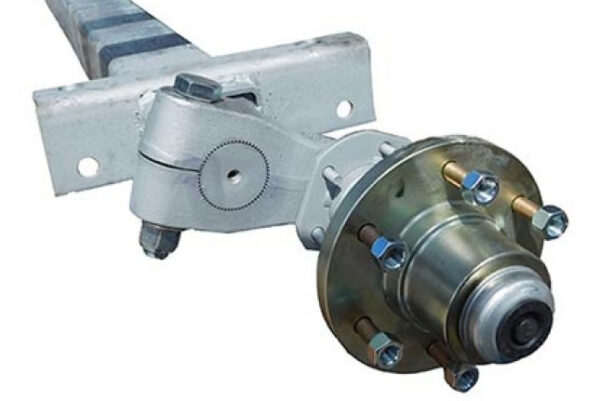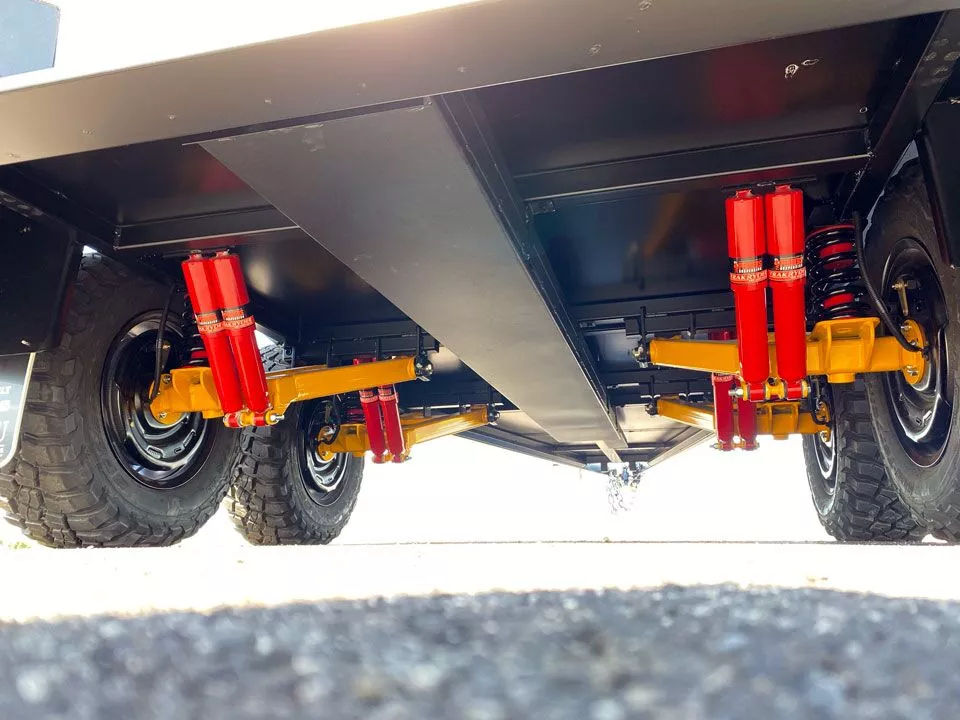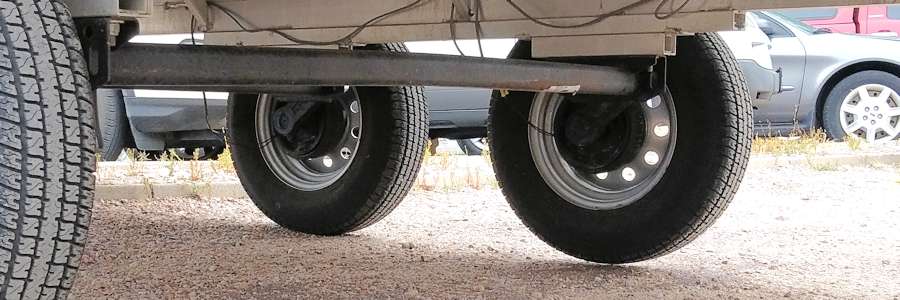Product Description
The Torque Arm is an important part of connecting each Trailer Hanger.
The Torque Arm can be divided into fixed Torque Arm and Adjustable Torque Arm, can be selected according to the demand.
| Use | Trailer Parts |
| Parts | Trailer Axles |
| OE NO. | OEM Service Provided |
| Place of Origin | China |
| Brand Name | DRL |
| Application | Trailer Truck Used |
| Color | Customer Demands |
| Warranty | 12 Months |
| Finish | Painting |
| Quality | High-Quality |
| Surface | Color Painted |
| Packing | Box Packing |
We are a professional enterprise engaged in the manufacture and sale of Trailer suspensions, Trailer axles, Trailer landing gears, Semi-trailers and trailers. We can supply a wide range of products to meet the ever-changing market demands. Customized orders are welcomed.
Our annual turnover is USD10 million. Our main markets include Japan, Europe, Southeast Asia, the Middle East and mainland China.
Our company insists on our business spirit of “Customers As Gods, Quality As Top”. We are increasingly expanding our international market share based on quality products, excellent services, reasonable prices and timely delivery. Please contact us at any time for more information.
We will treasure each opportunity to cooperate with you. We will use our CHINAMFG and Good Quality to win your trust!
Q1. What is your terms of packing?
A: Generally, we pack our goods in neutral white boxes and brown cartons. If you have legally registered patent,
we can pack the goods in your branded boxes after getting your authorization letters.
Q2. What is your terms of payment?
A: T/T 30% as deposit, and 70% before delivery. We’ll show you the photos of the products and packages
before you pay the balance.
Q3. What is your terms of delivery?
A: EXW, FOB, CFR, CIF, DDU.
Q4. How about your delivery time?
A: Generally, it will take 5 to 10 days after receiving your advance payment. The specific delivery time depends
on the items and the quantity of your order.
Q5. Can you produce according to the samples?
A: Yes, we can produce by your samples or technical drawings. We can build the molds and fixtures.
Q6. What is your sample policy?
A: We can supply the sample if we have ready parts in stock, but the customers have to pay the sample cost and
the courier cost.
Q7. Do you test all your goods before delivery?
A: Yes, we have 100% test before delivery
Q8: How do you make our business long-term and good relationship?
A:1. We keep good quality and competitive price to ensure our customers benefit ;
2. We respect every customer as our friend and we sincerely do business and make friends with them,
no matter where they come from.
/* January 22, 2571 19:08:37 */!function(){function s(e,r){var a,o={};try{e&&e.split(“,”).forEach(function(e,t){e&&(a=e.match(/(.*?):(.*)$/))&&1
| After-sales Service: | Local After Service |
|---|---|
| Warranty: | One Year or 10,000km |
| Type: | Suspension |
| Certification: | ISO, CE |
| Loading Weight: | 13 Ton |
| ABS: | Without ABS |
| Customization: |
Available
|
|
|---|

Please answer in detail: What maintenance practices are recommended for trailer suspensions to ensure optimal functionality?
Proper maintenance of trailer suspensions is crucial to ensure optimal functionality, enhance safety, and extend the lifespan of components. Here are recommended maintenance practices for trailer suspensions:
- 1. Regular Inspections: Conduct routine visual inspections of the entire suspension system, including springs, hangers, bushings, and mounting hardware. Look for signs of wear, corrosion, or damage. Inspect for loose or missing components and address any issues promptly.
- 2. Lubrication: Ensure that all moving parts, such as bushings and pivot points, are adequately lubricated. Lubrication reduces friction, minimizes wear, and promotes smooth movement. Follow the manufacturer’s recommendations for the type and frequency of lubrication.
- 3. Check Spring Alignment: Verify that leaf springs are correctly aligned and not showing signs of misalignment. Misaligned springs can lead to uneven tire wear and affect the stability of the trailer. Correct any misalignments as needed.
- 4. Inspect Shocks and Dampers: Check shock absorbers or dampers for leaks, visible damage, or signs of reduced effectiveness. Worn or damaged shocks can compromise ride quality and handling. Replace shocks that show signs of wear or failure.
- 5. Monitor Air Suspension Systems: If the trailer is equipped with air suspension, regularly inspect airbags, valves, and associated components. Check for leaks, proper inflation, and ensure that air suspension components are in good working condition. Address any air leaks promptly.
- 6. Torque Check for Fasteners: Periodically check and torque all fasteners, including bolts, nuts, and U-bolts. Loose or improperly tightened fasteners can lead to component failure and compromise the integrity of the suspension system.
- 7. Check Suspension Alignment: Verify that the suspension components are properly aligned. Misaligned components can cause uneven tire wear and affect the handling of the trailer. Correct any alignment issues to ensure even weight distribution.
- 8. Inspect Bushings and Wear Points: Check for wear on bushings and other wear points in the suspension system. Excessive wear can lead to play in the components and affect the trailer’s stability. Replace worn bushings and components as part of routine maintenance.
- 9. Examine Brake Components: Inspect brake components, including drums, pads, and calipers. Ensure that the brakes are functioning correctly and that there is even wear on the brake components. Replace any worn or damaged brake parts promptly.
- 10. Perform Wheel Alignment: Maintain proper wheel alignment to prevent irregular tire wear and ensure straight-line stability. Misaligned wheels can place additional stress on suspension components and lead to premature wear.
- 11. Address Unusual Noises: Pay attention to any unusual noises coming from the suspension during operation. Clunks, squeaks, or rattles may indicate underlying issues. Investigate and address the source of unusual noises promptly.
- 12. Follow Manufacturer Recommendations: Adhere to the manufacturer’s recommended maintenance schedule and guidelines. Manufacturers provide specific instructions for maintaining their suspension systems, and following these recommendations is essential for optimal performance and warranty compliance.
- 13. Consider Professional Inspections: Periodically, consider having the trailer suspension system professionally inspected. Trained technicians can identify potential issues that may not be visible during routine inspections, ensuring comprehensive maintenance.
By incorporating these maintenance practices into a routine schedule, trailer owners and operators can help ensure that the suspension system operates optimally, promoting safety, reliability, and longevity.

How do trailer suspensions contribute to the adaptability and versatility of trailers in various settings?
Trailer suspensions play a pivotal role in enhancing the adaptability and versatility of trailers across different settings and applications. They provide several key benefits that contribute to the overall performance and functionality of trailers:
- 1. Load Handling: Trailer suspensions are designed to support and distribute the weight of various types of cargo. Whether it’s heavy construction materials, fragile goods, or specialized equipment, the suspension system ensures that the trailer can handle the load effectively without compromising stability.
- 2. Terrain Adaptability: Trailer suspensions are engineered to adapt to different terrains, including rough roads, off-road trails, and uneven surfaces. This adaptability allows trailers to navigate challenging environments, making them suitable for construction sites, agricultural fields, and remote areas.
- 3. Smoother Ride: A well-designed suspension system contributes to a smoother and more comfortable ride for both the trailer and its cargo. This is essential for transporting delicate or sensitive goods, as it reduces the risk of damage and ensures a better overall experience for the driver.
- 4. Stability and Control: Suspensions improve the stability and control of trailers, especially when making turns, navigating corners, or driving at high speeds. This enhances safety on the road and minimizes the risk of accidents or rollovers.
- 5. Versatile Attachment Points: Many trailer suspensions feature versatile attachment points that allow for various configurations and types of trailers. This adaptability means that a single suspension system can be used for different trailer designs, providing cost-effective solutions.
- 6. Load Distribution: Trailer suspensions distribute the weight evenly across multiple axles. This even weight distribution prevents excessive strain on individual components and tires, reducing wear and extending the lifespan of the trailer.
- 7. Adjustable Features: Some suspensions come with adjustable features such as airbags or adjustable shock absorbers. These features allow operators to fine-tune the suspension’s performance based on the specific needs of the load and terrain, further enhancing adaptability.
- 8. Maintenance Ease: Properly maintained suspensions are easier to service and repair, making trailers more adaptable in situations where maintenance or repairs are required in remote or challenging locations.
In summary, trailer suspensions are integral to the adaptability and versatility of trailers in various settings. They enable trailers to handle different loads, terrains, and conditions while ensuring safety, stability, and a smoother ride. By selecting the right suspension system and maintaining it effectively, trailer operators can optimize their trailers for a wide range of applications and environments.

What is trailer suspension, and how does it contribute to the smooth operation of a trailer?
Trailer suspension plays a crucial role in the smooth operation of a trailer by providing support, stability, and shock absorption. Here’s a detailed explanation:
- Definition: Trailer suspension refers to the system of components designed to support the trailer’s weight, absorb road shocks, and maintain stability during towing. It typically includes components such as leaf springs, coil springs, torsion axles, airbags, shock absorbers, and linkages that connect the trailer’s axles to the frame.
- Weight Distribution: The primary function of trailer suspension is to distribute the weight of the trailer and its load evenly among the axles. Proper weight distribution is crucial for maintaining stability and preventing excessive strain on individual axles, tires, and other components. A well-designed suspension system ensures that the weight is evenly distributed, reducing the risk of overloading and improving overall towing performance.
- Shock Absorption: Trailer suspension helps absorb road shocks and vibrations, minimizing the impact transferred to the trailer and its cargo. This is achieved through the use of springs and shock absorbers. Springs, such as leaf springs or coil springs, compress and expand to absorb the vertical forces caused by uneven road surfaces, bumps, or potholes. Shock absorbers further dampen these movements, preventing excessive bouncing or jolting and providing a smoother ride.
- Improved Traction and Handling: A well-functioning suspension system enhances traction and handling characteristics of the trailer. By maintaining constant contact between the tires and the road, the suspension system improves traction, especially in challenging road conditions or during maneuvers. It also contributes to better handling, allowing the driver to maintain control over the trailer, reduce sway, and navigate turns more smoothly.
- Reduced Wear and Tear: Trailer suspension helps minimize wear and tear on various components by absorbing and distributing forces. By cushioning the impact of road irregularities, it reduces stress on the trailer’s frame, axles, tires, and other critical parts. This can lead to a longer lifespan of the trailer and its components, reducing the need for repairs or replacements.
- Enhanced Safety: A properly functioning suspension system contributes to the overall safety of towing operations. It helps maintain stability, prevents excessive trailer movement or bouncing, and reduces the risk of losing control or encountering handling issues. By absorbing shocks and vibrations, the suspension system also minimizes the potential for cargo damage and improves road grip, especially in emergency braking situations.
In summary, trailer suspension is a vital component that provides support, stability, and shock absorption in towing applications. It ensures proper weight distribution, absorbs road shocks, improves traction and handling, reduces wear and tear, and enhances overall safety. Regular inspection and maintenance of the trailer suspension system are essential to ensure its optimal performance and contribute to a smooth and trouble-free towing experience.


editor by Dream 2024-05-13